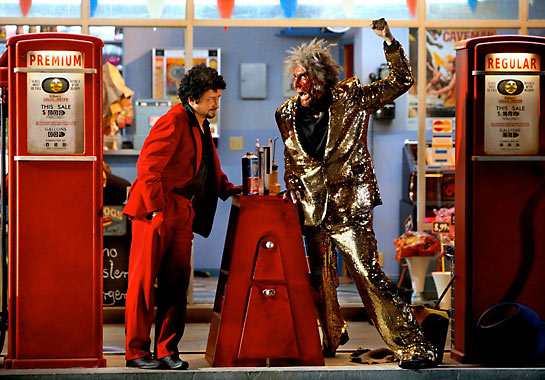Bayreuth Festival 2010
Curtain Down on Tankred Dorst's Ring
The concept for Tankred Dorst's well-known Ring was a sketch for something that could have been interesting but failed, unfortunately, in its execution. Indeed, the worst thing about this Ring production is that it never actually developed.
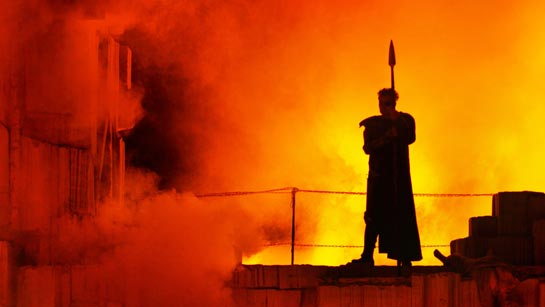
Albert Dohmen as Wotan in Die Walküre, a good example of why this production was termed a "postcard Ring" The sets were static and even beautiful at times, but that was all. Photo: Enrico Nawrath / Bayreuther Festspiele
The production team had had all the time in the world to make improvements, but they closed their ears to criticism and clearly had no idea how to make things better. At Bayreuth this is unforgivable. No wonder, then, that Tankred Dorst was met by a wall of vociferous boos (and some compensating cheers) from the merciless Bayreuth audiences when he came out before the curtain after the final Götterdämmerung. The Dorst Ring is now history.
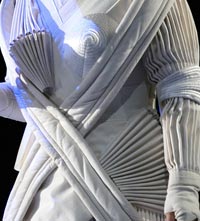
Dorst thought it was time to steer away from making the mythological world contemporary. Instead he wanted to emphasize the extraordinary character of the gods and half-gods. They were to be portrayed as powerful (mächtig), strange (fremd) and distant (fern). Dorst wanted to allow the gods to emerge from the "depths of time" and not, for example, to look like creatures from the middle ages or our own age. The way the gods appeared should make it clear that they drew their life force from the elements. This may sound interesting, but Dorst forgot to ask himself the crucial question as to how anyone in the audience could come to care for gods portrayed in this way.
Because the gods, according to Tankred Dorst's concept, had no homes to dwell in, they should appear here, there and everywhere. If the settings suggest a time, it is our time. Ordinary people come and go or sit down reading a paper without noticing the gods. In Rheingold and Götterdämmerung some scenes take place on a concrete, bridge-like structure, obviously in a big city. In Die Walküre Act 2, the "action" takes place in a storage room with antique monuments stowed away, and Act 1 of Siegfried is set in a deserted and chaotic classroom.
All this might have been more easily digestible if it had been produced with intelligence, theatrical energy, and a will to create exciting music drama. Unfortunately everything went wrong. By making the gods distant and strange, Dorst only made them uninteresting. It was impossible to love or hate, not to mention feel compassion – or feel anything – for the characters. The tragedy of Wotan's inner torments and downfall was totally absent, and this was not Albert Dohmen's fault. Think about the tormented but dignified Wotan character in Chéreau's Centenary Ring or John Tomlinson's tornado of terror and desperate actions (in Harry Kupfer's Ring) by way of contrast. One wonders what Tankred Dorst saw in Wotan. If it was tragedy, he certainly failed to make the audience feel or understand it. This may well be one of the worst portrayals of Wotan in any Ring. Stage directions were absent, static or clumsy. Take one example: Wotan's entry and call for Erda in Act 3 of Siegfried. With no apparent directions to guide him, Dohmen simply walked back and forth to pass the time before he could begin singing.
The main reason I wanted to attend this final outing of the Ring cycle was the conductor Christian Thielemann, a true romantic and Wagnerian, who achieves the most wonderful climaxes and whose masterly control over the orchestra creates a Wagner sound that combines a wealth of detail with a drive that is absolutely spellbinding. Occasionally, I missed a more analytical sound, with greater transparency and less rhetoric bombast, but this is not Thielemann's cup of tea.
Das Rheingold
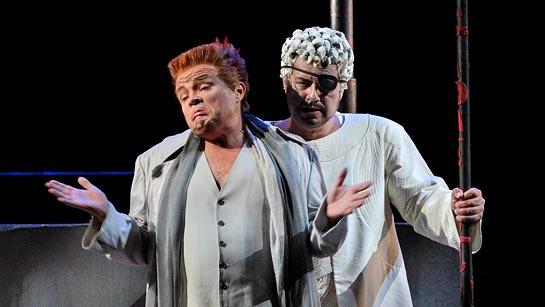
Loge (Arnold Bezuyen) and Wotan (Albert Dohmen) in Das Rheingold.
Photo: Enrico Nawrath / Bayreuther Festspiele
Das Rheingold was a musical treat from first note to last. Not a single serious weak link. The orchestra was as good as it gets, and the singers all contributed to a magnificent evening on the Green Hill. Two of the sets are really very beautiful. The first is the river Rhine in blue and cyan with the beautiful Rhinedaughters (in excellent voice) in bright splashes of red and orange. And the second is the industrial basement and the vault hiding the gold. But having said this, I must lament the fact that Dorst and his team didn't explore any of the possibilities the Bayreuth stage offers regarding scene changes. One wonders what a more creative production team might have done with the same sets.
Johan Reuter stepped in for Albert Dohmen, who was ill, to make his Bayreuth debut as Wotan. He acquitted himself well. Mihoko Fujimura disappointed as his wife Fricka, too often short of breath and struggling to sustain long phrases. Andrew Shore (Alberich) was perfect, as usual, even if I don't approve of the director presenting the greedy dwarf as a grotesque clown, as he did with a more spoken than sung Mime (Wolfgang Schmidt – a former Siegfried here in Bayreuth). Arnold Bezuyen's Loge is one of the highlights of this production. He sings brilliantly and acts with intelligent, ironic verve.
Die Walküre
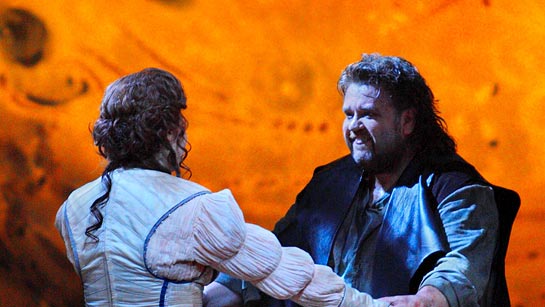
Edith Haller (Sieglinde) and Johan Botha (Siegmund) in Act 1 of Die Walküre, Bayreuther Festspiele 2010. Photo: Enrico Nawrath / Bayreuther Festspiele
Since acting skills, on the whole, are not required in this Ring, it was totally appropriate that a singer like Johan Botha was offered Siegmund for the final year of this Ring. The man can barely move around the stage, and spends little time delving into the depths and subtleties of the text, but he sings Siegmund perhaps better than any other tenor today. You just have to close your eyes and enjoy the beauty of his phrasing and the ease with which the difficult passages flow out into the auditorium.
By his side, Edith Haller made a sensational Sieglinde (replacing Eva-Maria Westbroek, who was busy singing Chrysothemis in Elektra at the Salzburg Festival). Kwangchul Youn sang beautifully as Hunding, who in this production is portrayed as somewhat less evil than we are used to. Albert Dohmen (Wotan) sounded weak on this evening, perhaps not yet fully recovered after his illness? I imagine the sound technicians can make him sound stronger on the upcoming DVD. Linda Watson sounded as she has always done. In a Ring production like this, it bothers me less to hear a singer of the old dramatic soprano school. Her acting is generally not in evidence, but her big voice and the relative ease with which she sings the high notes is often a thrill to experience. She is rather shrill, though, in the upper register, and you can't expect to discern too clearly much of what she sings.
Siegfried
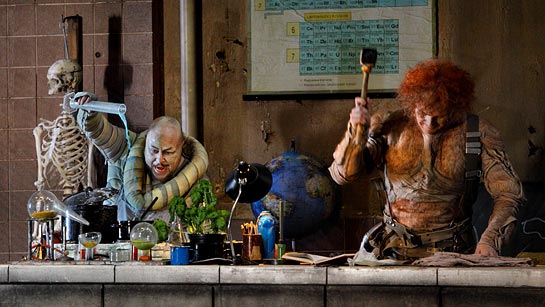
Wolfgang Schmidt and Lance Ryan in Act 1 of Siegfried, Bayreuther Festspiele 2010. Photo: Enrico Nawrath / Bayreuther Festspiele
Act 1 of Siegfried is the most successful single act in Tankred Dorst's Ring. The act is set in a classroom, which leads to some energetic and amusing scenes. The interaction between Siegfried and Mime, and Mime and Wotan is very well executed. As meaningful interaction between the singer-actors in most of the Ring is totally absent, one wonders if the singers act on their own account or if this is according to Dorst's stage direction. If Dorst is capable of creating such intense stage interaction, why didn't he do it more often in this Ring?
Lance Ryan made his Bayreuth debut as Siegfried, and this was the most interesting novelty in this year's Ring. Ryan has previously sung Siegfried in Valencia (on DVD), Salzburg, Karlsruhe, Ghent, Antwerpen, Strasbourg and Firenze. His future Siegfried plans include engagements in Shanghai, Strasbourg, Frankfurt, Munich, Berlin and La Scala, so there's no doubt that he is one of the hottest names in the heroic tenor game these days. The Canadian tenor is overall a very good Siegfried, and better in Götterdämmerung than in Siegfried. This evening he was at his absolute best as an aggressive teenager in Act 1 when he can use his power. He doesn't have a big voice, and this becomes very evident in Siegfried's confrontation with Wotan on the rock ledge (maybe the missing background swallowed some of the sound?). However, I found the lack of tenderness and poetry in the softer passages more problematic, such as when Siegfried sings "Wie sah meine Mutter wohl aus?" and "Seeliger öde auf wonniger Höh". Ryan's stage presence is impressive, and he acted with wonderful energy. The Bayreuth audiences were very enthusiastic. Let's hope that taking on this role so early in his career doesn't ruin his voice.
Albert Dohmen sounded much stronger in Siegfried than in Die Walküre, perhaps because he had now (fully) recovered after cancelling Rheingold. Both he, Linda Watson, Andrew Shore and Wolfgang Schmidt's Mime received well-deserved, enthusiastic cheers from the Bayreuth audiences.
Götterdämmerung
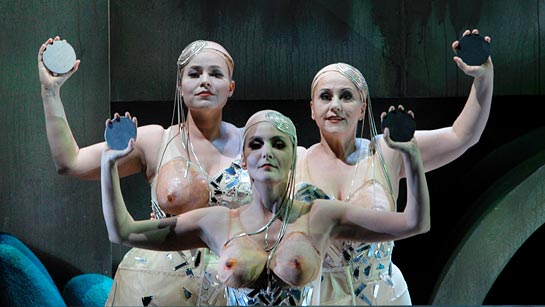
The Rhinedaughters in Tankred Dorst's Götterdämmerung ready for the very last boob shake. Photo: Enrico Nawrath / Bayreuther Festspiele
The decadence of the Gibichungen produces the best theatre in this production, which isn’t saying much. The sets, which can represent part of a castle or a hotel (bell boys are running around), allow the stage action to form some interesting movements by individuals and groups. So, as a whole, Götterdämmerung is the best of the four dramas in Tankred Dorst's Ring. One wonders, though, what prompted the production team to include some rather ridiculous and disconcerting elements like the person with the convulsively bobbing head of a hen walking down the stairs at daybreak, not to mention the double boob shake from the Rhinedaughters. And the catastrophe at the very end is a veritable anti-climax. It's nothing more than a house fire, with people noisily running for their lives. Unfortunately Dorst couldn't resist putting a kissing couple in the middle of the stage when the redemption motif sounds. Love conquers all. Just not this production.
Only two of the singers stood out tonight, having offered something extraordinary: Andrew Shore as Alberich and Lance Ryan as Siegfried. Both were cheered enthusiastically by the Bayreuth audiences, who also showed their appreciation for what Christian Thielemann has achieved with the Bayreuth orchestra with a well-deserved standing ovation.
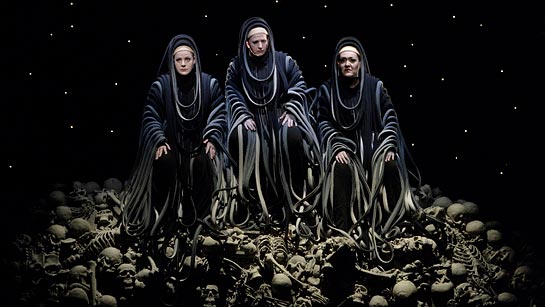
The Norns in Tankred Dorst's Götterdämmerung production. Bayreuther Festspiele 2010. Photo: Enrico Nawrath / Bayreuther Festspiele
(Thanks to Jonathan Scott-Kiddie!)
Wagner Articles and Reviews on Wagneropera.net
Reviews by Mark Berry on Wagneropera.net
Bayreuth Festival
- Bayreuth 2022: Das Rheingold (Valentin Schwarz / Cornelius Meister)
- Bayreuth 2022: Die Walküre (Valentin Schwarz / Cornelius Meister)
- Bayreuth 2022: Siegfried (Valentin Schwarz / Cornelius Meister)
- Bayreuth 2022: Götterdämmerung (Valentin Schwarz / Cornelius Meister)
- Bayreuth 2019: Tannhäuser (Tobias Kratzer / Christian Thielemann)
- Bayreuth 2019: Lohengrin (Yuval Sharon / Christian Thielemann)
- Bayreuth 2019: Die Meistersinger von Nürnberg (Kosky/Jordan)
- Bayreuth 2019: Tristan und Isolde (Katharina Wagner/Christian Thielemann)
- Bayreuth 2017: Die Meistersinger von Nürnberg (Kosky/Jordan)
- Bayreuth 2017: Parsifal (Uwe Eric Laufenberg / Hartmut Haenchen)
- Bayreuth 2017: Das Rheingold (Frank Castorf / Marek Janowski)
- Bayreuth 2017: Die Walküre (Frank Castorf / Marek Janowski)
- Bayreuth 2017: Siegfried (Castorf/Janowski)
- Bayreuth 2017: Götterdämmerung (Castorf/Janowski)
- Bayreuth 2016: Parsifal (Uwe Eric Laufenberg / Hartmut Haenchen)
- Bayreuth 2016: Tristan und Isolde (Katharina Wagner / Christian Thielemann)
- Bayreuth 2016: Götterdämmerung (Frank Castorf / Marek Janowski)
- Bayreuth-2016: Siegfried (Frank Castorf / Marek Janowski)
- Bayreuth 2016: Die Walküre (Frank Castorf / Marek Janowski)
- Bayreuth 2016: Das Rheingold (Frank Castorf / Marek Janowski)
- Bayreuth 2014: Frank Castorf Ring: Das Rheingold
- Bayreuth 2014: Frank Castorf Ring: Die Walküre
- Bayreuth 2014: Frank Castorf Ring: Siegfried
- Bayreuth 2014: Frank Castorf Ring: Götterdämmerung
- Bayreuth 2014: Lohengrin
- Bayreuth 2012: Stefan Herheim's Parsifal
- Bayreuth 2012: Gloger's Dutchman
- Bayreuth 2012: Neuenfels Lohengrin
- Bayreuth 2011: Tannhäuser (Baumgarten)
- Bayreuth 2011: Stefan Herheim Parsifal
- Bayreuth 2011: Marthaler Tristan und Isolde
- Bayreuth 2011: Neuenfels Lohengrin
- Bayreuth 2011: The Ring for Children
More Reviews
- Berlin 2010 Cassiers Ring
- ROH 2009: Loy's Tristan
- ROH 2010: Tim Albery's Tannhäuser
- ROH 2011 Tim Albery's Dutchman
- Daniel Barenboim: Complete Wagner Operas (34 CD)
Reviews from the Bayreuth Festival
More Reviews
- Stefan Herheim: Lohengrin. Staatsoper Berlin, 2009: Den norske opera-regissøren Stefan Herheim fortryller Berlin. (Norwegian)
- Wagner i Alpene og opera i Norge (Operafestspillene i Erl - Tiroler Festspiele Erl) (Norwegian)
- Den ustanselige aktualitet: Richard Wagner i Bayreuth 1998 (Norwegian)
- Richard Wagner-Festspiele, Bayreuth 1999 Men kvinnene døde stående (Norwegian)
- Richard Wagner-Festspiele, Bayreuth, 1999. Lohengrin: Tynget av symboler, men dyster og sterk (Norwegian)
- Jürgen Flimms Ring i Bayreuth, 2000: Politikkens omslag i musikk (Norwegian)
- Schlingensiefs Parsifal: Døde harer og herlig musikk i Bayreuth (Richard Wagner-Festspiele 2004) (Norwegian)
- Der Ring des Nibelungen: Ringen er sluttet i København (Norwegian)
- Stefan Herheim: Parsifal (2008). Mystikk og begjær i Bayreuth (Norwegian)
Selected Reviews and articles
- Nila Parly: The Copenhagen Ring (Kasper Holten)
- Nila Parly: Visions of the Ring
- Bayreuth 2015: Sam Goodyear on Tristan
- Berlin 2015 Sam Goodyear on Meistersinger (Moses)
- Parsifal, Gran Teatre Liceu
- Haenchen / Kusej Dutchman
- Metropolitan 2010: Das Rheingold
- Metropolitan 2011: Die Walküre
- Washington National Opera: Götterdämmerung 7 November 2009
- Washington National Opera: Götterdämmerung 15 November 2009
- Washington National Opera: Siegfried, 2 May 2009
- Washington National Opera: Siegfried, 9 May 2009
- Berlin 2009: Stefan Herheim's Lohengrin
- Oslo: Stefan Herheim's Tannhäuser
- Los Angeles 2009: Das Rheingold
- Lincoln Center 2012: Rienzi
- Bayreuth 2010: Neuenfels Lohengrin
- Bayreuth 2013. Frank Castorf's Ring There Will Be Blood: Frank Castorf Has Entered the Ring
- Bayreuth 2010: Tankred Dorst's Ring
- Bayreuth 2010: Katharina Wagner's Meistersinger

Der Ring des Nibelungen: Articles and Reviews
Nila Parly on Regietheater: Visions of the Ring
The Cry of the Valkyrie: Feminism and Corporality in the Copenhagen Ring
Sam Goodyear, Bayreuth 2022: Der Ring des Nibelungen (Valentin Schwarz)
Mark Berry, Bayreuth 2022: Das Rheingold (Valentin Schwarz)
Mark Berry, Bayreuth 2022: Die Walküre (Valentin Schwarz)
Mark Berry, Bayreuth 2022: Siegfried (Valentin Schwarz)
Mark Berry, Bayreuth 2022: Götterdämmerung (Valentin Schwarz)
Mark Berry: Bayreuth 2017: Das Rheingold (Frank Castorf / Marek Janowski)
Mark Berry: Bayreuth 2017: Die Walküre (Frank Castorf / Marek Janowski)
Mark Berry: Bayreuth 2016: Das Rheingold (Frank Castorf)
Mark Berry: Bayreuth 2016: Die Walküre (Frank Castorf)
Mark Berry: Bayreuth 2016: Siegfried (Frank Castorf)
Mark Berry: Bayreuth 2016: Götterdämmerung (Frank Castorf)
Mark Berry: Bayreuth 2014: Das Rheingold (Frank Castorf)
Mark Berry: Bayreuth 2014: Die Walküre (Frank Castorf)
Mark Berry: Bayreuth 2014: Siegfried (Frank Castorf)
Mark Berry: Bayreuth 2014: Götterdämmerung (Frank Castorf)
Per-Erik Skramstad: Bayreuth 2013: There Will Be Blood: Frank Castorf Has Entered the Ring
Per-Erik Skramstad: Bayreuth 2010: Curtain Down on Tankred Dorst's Ring
Mark Berry: 2010 Cassiers Ring
Sam Goodyear: Laufenberg’s Wiesbaden Ring 2017
Jerry Floyd: Rheingold, Metropolitan 2010
Jerry Floyd: Die Walküre, Metropolitan 2010
Jerry Floyd Washington National Opera: Siegfried
Jerry Floyd Washington National Opera: Siegfried II
Jerry Floyd Washington National Opera: Götterdammerung Concert (2009)
Jerry Floyd Washington National Opera: Götterdammerung Concert (2009)
Mark Berry: Richard Wagner für Kinder – Der Ring des Nibelungen (2011)

